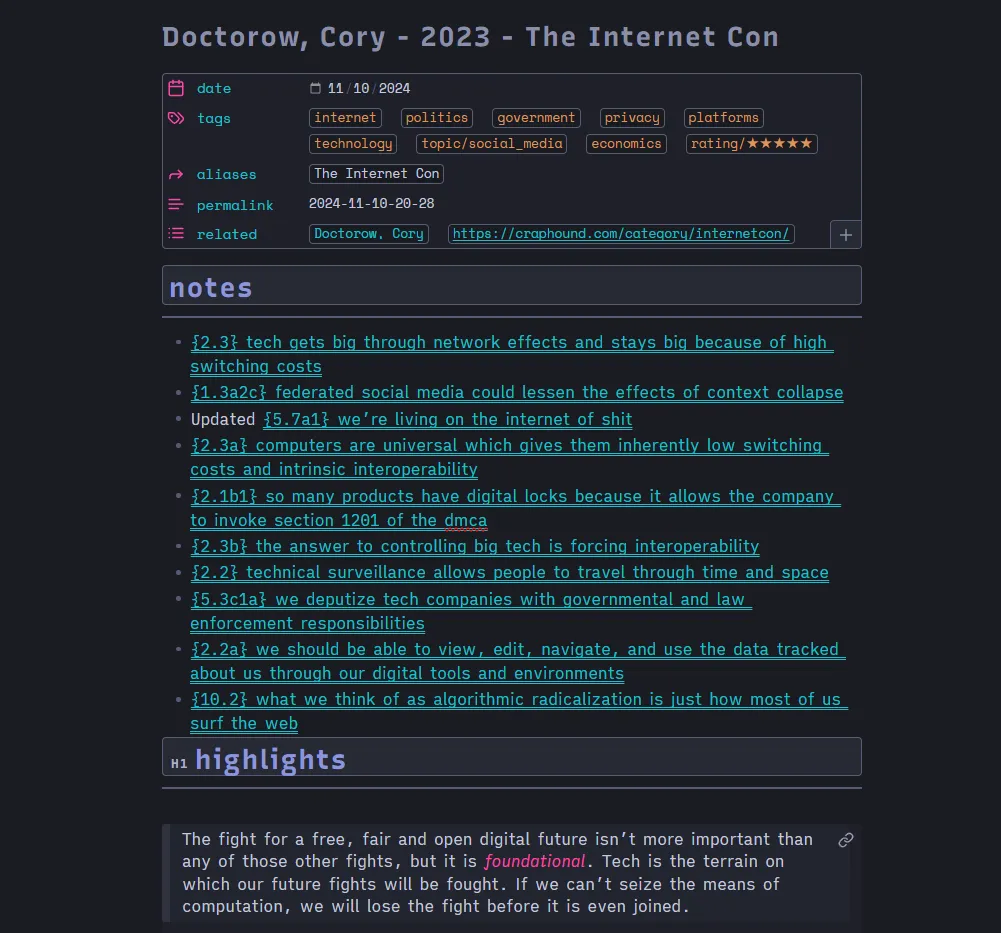the notes post
another sunday meeting last weekend, this time outside the coffee shop until a storm rolled in. a couple of us met up after at the bookstore; i picked up recoding america, which – don’t ask me why – i thought might be an emotional reprieve from the feminist discourse of art monsters.
then i stopped by a friend’s house for a few hours. we talked a bit about indieweb stuff, blogging, platforms, he showed me 750words.
we also talked about notes and i’ve, sigh, been trying to articulate my approach to notes for such a long time. it’s hard, first, because it’s such a consistently evolving thing and, second, because the entire concept of “notes” has become a black hole of meaning for me.
/
everyone in the Notetaking Extended Universe will try to sell you on their specific system, structure, or process for taking, organizing, and using notes. all of them come down to the same three steps:
input > process > output
you find data that makes you feel / think / wonder something; you analyze / contextualize / synthesize that data to figure out what it means to you; and then you do something with / about / because of that data and this process.
/
“data” is an unfortunately sterile term, but it is romantic in its ability to encompass almost anything; data can be dreams, books, music, trips, memories, sticky notes, phone alarms, journal entries, task lists – the objective of your subjective.
ideally, over time, you work toward a system that can incorporate as much of that varied data as possible. not “as much data as possible” generally, but as many types of data as possible – whatever tiny pieces of the world and your experience in it that you want to tuck away.
/
you might think of a note as any artifact which captures, communicates, or otherwise allows you to interact with some point of data. notes on books or trips or dreams are likely familiar to you, even if you call them something else – book summaries, dream diaries, whatever name they have, at their most basic, these are all notes, some record of some information that you can interact with over time.
notes are finnicky in that i find them best defined like this – as broadly as possible – but, in practice, atomicity is valuable.
an atomic note is one that explicitly captures one single point of data. in most contexts, this refers to one file communicating one idea; instead of having one long running note on everything i’ve learned about identity, each of the ideas and concepts i find most important have their own individual note. but you can also think about atomicity with… pretty much everything else; each film, book, album, vacation, dream log, joke, character, restaurant can have their own notes too.
expanding what you think of as a “note” can help you gather more information in your system, but limiting what goes into each of those notes helps you reuse, reference, cite, link to, annotate everything across your system granularly.
/
let’s pretend you’ve just gotten done reading a book and are ready to take your first notes. there is no wrong way to do this, but here’s what i do:
- create a page for the book to collect my notes; i call this a “source note”, but you might hear it referred to as a “lit note”, “book note”, etc.
- re-read my highlights and annotations, transferring the most resonant ones to my new page as i go by typing them out or syncing if i’m working digitally
- go back through the book chapter by chapter, taking rough bullet point notes on my page as a i go.
- group those bullet points into similar themes and concepts.
- create an atomic note for each theme or concept, each on its own page, transferring my bullet points to their new homes as necessary. the titles for each atomic note gets linked in the source note page.
eventually, i end up with something like this:

ignore the alphanumeric IDs before the note titles; each of the bullet points under the notes header is its own self-contained thought from, or inspired by, the book that the note is linked within.
consider the last note in the list, about algorithmic radicalization. that’s related to lots of different things – the web, social media, politics, sociotechnical systems, literacy, accessibility, marketing, SEO… using a system built around atomic notes, i can reference this idea anywhere, no matter what i’m writing about. if that note had stayed a bullet point nested in another page with lots of other unrelated thoughts, it wouldn’t be so simple.
/
in the cycle i mentioned earlier, reading a book might be your input and taking notes on that book might be your processing step.
output is a bit more nebulous and my eyes are glazing over already, so maybe more later.
in summary:
- everything is note-able
- everything is either something you find, something you think, or something you create
- working bottom-up by taking notes with those two principles in mind, you can formulate a more intentional system and organizational strategy later 👍
last modified 1 month ago | reply via email